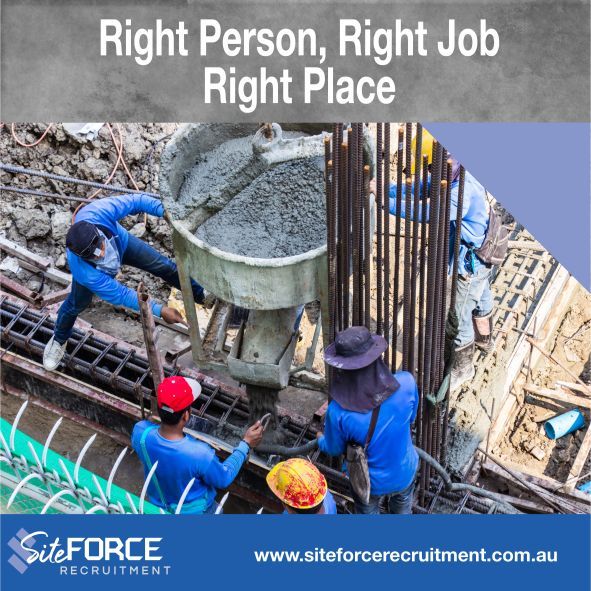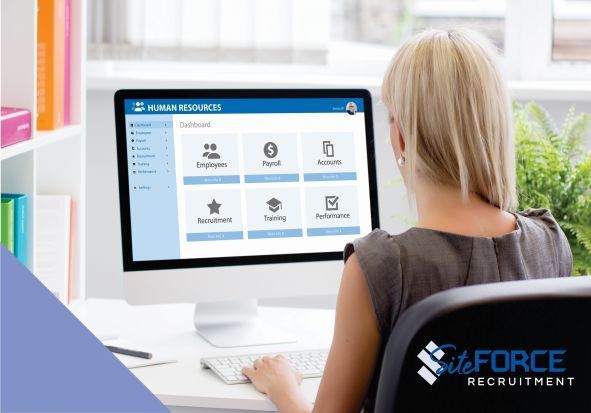Right Person, Right Job, Right Place
Employer’s Perspective with Kelly Washbrook from Danandkel Projects

Hiring errors can be crippling and costly, especially in a competitive job labour market that is also facing major skills shortages. This means it has never been more important for you to get the right person, in the right job at the right place quickly and efficiently.
Luckily, Kelly Washbrook from Danandkel Projects, shares her experience of being a client of SiteForce, and some key insights on why recruiting is one of the toughest challenges faced by an organisation, and where SiteForce has been a key to their success.
Chantal: Welcome Kelly, tell me about your firm, your relationship with SiteForce and the type of people we supply to you?
Kelly: We are a form working company predominantly and do carpentry as well. We’ve been a client for roughly two years, and get a mixture of form workers and general labourers.
Chantal: How have you found the people who have come to your site, are they skilled enough and know what they are doing?
Kelly: Oh yeah, absolutely. They are always fit for the purpose that we need them for.
Chantal: What would you say is the point of difference that you have found using SiteForce, compared to other labour hire companies that you have used previously?
Kelly: The benefit of SiteForce, is the speed and efficiency of getting good people on site. We can let you know the day before, and then we have people rock up ready to go on site the next day.
Chantal: We’ve had a bit of a tough labour market of late, how has that affected things?
Kelly: Just being able to have the security of using you and getting people at short notice is a huge help.
Chantal: Do you just use labour hire, or do you use it to supplement your team?
Kelly: For us, it is pretty much to boost up the numbers. That’s the benefit of using labour hire as when you don’t need it you can drop back to your normal crew. Then when you get a week that is super busy, you just bump it up with whatever numbers you need.
Chantal: How long do you usually the people that come through labour hire?
Kelly: It varies. You know, we’ve been using you from the beginning, and we’ve had some people from you for months on end. Sometimes we just need them for a week, so it just depends on what we are doing.
Chantal: In your honest view, what would you say are the challenges with labour hire?
Kelly: I can't really think of any, to be honest. Like it's all just positive. Yeah, it's all just crazy good. They, they just come in prepared, turn up at 6:30, do a days work and do what they're told and go home.
Chantal: Would you say on the whole, that has been your experience with most people that we’ve supplied to you. We know a major gripe in the labour hire industry is getting unskilled people, or people that don’t turn up. How have you found working with us?
Kelly: I don't have any gripes at all. If I did, I wouldn’t use this. There is still that stigma about using labour hire sometimes. You know, people thinking, that if they are so good at their job, then what are they doing working for a labour hire company, when in actual fact, you know, definitely for me, these workers are actively using the internet and seeking out these arrangements. They’re proactive scrolling on their phones for new jobs. That’s why, you know, obviously labour hire or recruitment has become such a big thing.
Chantal: Yes, the big positives for business, like you were saying, is to be able to boost your teams and productivity for as long as you need them. Not just labour, but people who are experienced on your specific needs that is fit for purpose. We supply highly skilled teams that are more competent to do what they’ve been brought in to do, not just some knob job working at a lower level than you need.
Kelly: Yeah, you’ve got some that work harder than the others.
Chantal: I get good feedback from so many great companies like yourself from people that come and work for you guys and I know some candidates look at these jobs as an opportunity to end up with a full-time job. Is there opportunity for the guys to get full-time work?
Kelly: I'm not just going to use on labour-hire. Yeah. You know, because sometimes I like, that's the other frustrating thing, like, because we're in the market that we're in. You've got these really good guys, and then they're like, oh, I've got a job somewhere else. And you're like, well, why would you just get up and leave? Like, you've got a job here. Yeah. You're literally doing it right now. And why didn't you come and ask me whether we would at least offer you a job? You know what I mean? I'm definitely sort of, um, touching ground on that as well as, you know, how we can use people better on different sites.
Chantal: Obviously I’m committed to sending qualified people and skilled people, and then they get to site and there's no communication and so the site supervisors or foreman aren't actually talking to my skilled people and saying,: What do you do? Where can we put you? What other skills do you have or what else do you do? Where do you fit best?
Kelly: You know, I think for us that's why it's quite good that it's Daniel or I on site. Being the owners we ask those questions. But I know often people running sites are just trying to get the job done and don’t spend that time to figure out how to use people in the best way for their own benefit.
Chantal: I know, we do find that we send highly skilled people to job sites, and they are sometimes not utilised properly. I keep on saying, sometimes you have to slow down to go fast. We are really trying to educate people. We know there are time restraints, but if you just pull back a minute at the beginning, you will utilise people at their best if you engage and ask them. Not only will have them working at top speed, they’ll have clarity, know the daily targets, and they’ll be thriving and getting things done. It’s about putting the right person, in the right job in the right place.
Kelly: Exactly. We give them clear targets, like we want you to do A, B, then C and don’t assume anyone knows anything. We spend just five minutes every morning before they start on site and the priorities for them. Everyone meets at a central point and we go through what needs to be done for the day. Every single day. Obviously things change and it is a guideline, but it works. It makes the whole work site more conducive. Everyone’s talking, knowing what’s going on, and on the same page.
Chantal: Yes, in my experience, sometimes you have to change your communication style as well to make sure that you know everyone understands, whether it is the new generation coming through that have a different style of communicating and your 65 year old workers. And coming from a labour hire perspective, making sure that they feel included, part of the team. That doesn’t happen often, but sometimes there is still that going on in the industry.
Kelly: And again, there's, you know, breaking that stigma that just because he is labour high, you know, he may not be here tomorrow or he is not skilled or, you know, whatever it may be at works much better if you include them in what's going on and make them part of the team. Yeah. You find that you get a lot more done.
Chantal: Yes, and that how I’ve found you get the best out of someone too.











